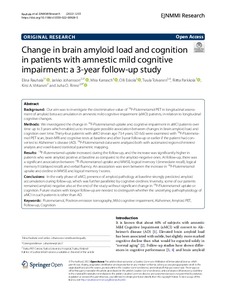Change in brain amyloid load and cognition in patients with amnestic mild cognitive impairment: a 3-year follow-up study
Rauhala Elina; Johansson Jarkko; Karrasch Mira; Eskola Olli; Tolvanen Tuula; Parkkola Riitta; Virtanen Kirsi A; Rinne Juha O
https://urn.fi/URN:NBN:fi-fe2022102463156
Tiivistelmä
Background
Our aim was to investigate the discriminative value of F-18-Flutemetamol PET in longitudinal assessment of amyloid beta accumulation in amnestic mild cognitive impairment (aMCI) patients, in relation to longitudinal cognitive changes.
Methods
We investigated the change in F-18-Flutemetamol uptake and cognitive impairment in aMCI patients over time up to 3 years which enabled us to investigate possible association between changes in brain amyloid load and cognition over time. Thirty-four patients with aMCI (mean age 73.4 years, SD 6.6) were examined with F-18-Flutemetamol PET scan, brain MRI and cognitive tests at baseline and after 3-year follow-up or earlier if the patient had converted to Alzheimer ' s disease (AD). F-18-Flutemetamol data were analyzed both with automated region-of-interest analysis and voxel-based statistical parametric mapping.
Results
F-18-flutemetamol uptake increased during the follow-up, and the increase was significantly higher in patients who were amyloid positive at baseline as compared to the amyloid-negative ones. At follow-up, there was a significant association between F-18-Flutemetamol uptake and MMSE, logical memory I (immediate recall), logical memory II (delayed recall) and verbal fluency. An association was seen between the increase in F-18-Flutemetamol uptake and decline in MMSE and logical memory I scores.
Conclusions
In the early phase of aMCI, presence of amyloid pathology at baseline strongly predicted amyloid accumulation during follow-up, which was further paralleled by cognitive declines. Inversely, some of our patients remained amyloid negative also at the end of the study without significant change in F-18-Flutemetamol uptake or cognition. Future studies with longer follow-up are needed to distinguish whether the underlying pathophysiology of aMCI in such patients is other than AD.
Kokoelmat
- Rinnakkaistallenteet [27094]
